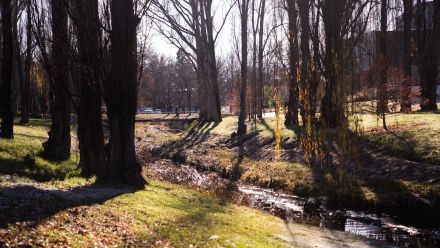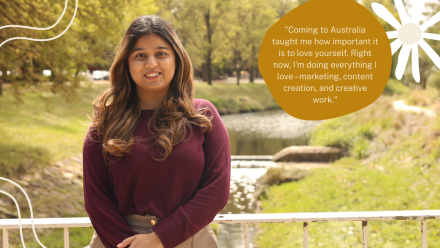Professor Message-Jones explores ¤Öêüäšäûcommunityãs resilience
Where does experience end and memory begin? And whose memories get turned into history? These are just some of the questions Professor Kylie Message-Jones asks in her work investigatingthe relationships between museums, politics and culture.
Professor Message-Jones is the Director of the ¤ÖêüäšäûHumanities Research Centre, Research Fellow at the National Museum of Australia and an active member of the ¤Öêüäšäûcommunity. Like all of us, she has lived through successive challenges over the last five years, starting with the flash flood that hit campus in 2018, followed in 2020 by the overlapping disruptions resulting from the hailstorm, bushfires and the multi-year pandemic.
"While people everywhere suffered from the disruptions of COVID-19, our experience at ¤Öêüäšäûwas unusual because the pandemic was just one of multiple crises that caused staff and students to experience consecutive waves of displacement," Professor Message-Jones says. "In many ways, we continue to live with the impacts of these crises too. The ongoing work to restore buildings damaged by flooding and hail is just one example of that."
To ensure that our shared memories and institutional history of this time would not be lost, Professor Message-Jones invited colleagues from 13 different campus buildings and work areas to share their experiences of the last five years. She has woven their testimonies into a new paper, 'Rebuilding Cultures of Community on a Post-Covid-19 University Campus', which will be published in the journal Humanities Research later this year.
"I heard stories of agile thinking and action; about rainwater pouring down office walls while people frantically piled books into the centre of rooms; about how adept they have become at safely transferring art works, precious artefacts and furniture on wobbly trolleys across sites through multiple trips and relocations."
Professor Message-Jones said multiple people spoke about the scaffolding on campus, connecting it with feelings of loss and disruption. Many spoke of how the move to working from home had led to the loss of serendipitous hallway conversations and critical in-person connections.
"They observed how comfortable we have become with phrases like 'hail remediation' and being 'decanted' from a building. They talked about the need to restore and rebuild themselves and their communities alongside or even despite the building repair work."
Yet for others the scaffolding is also a symbol of resilience and hope. "This was nowhere as evident as when Master of University House said: 'the scaffolding was the first visible expression of the University's commitment to the long and complicated process of repairing University House'."
Reflecting on what she heard and learned from colleagues, Professor Message-Jones says she was grateful for the candid and moving responses that showed both generosity and caring for campus communities and workplaces. She believes it will continue to take time for many ¤Öêüäšäûcommunity members to process their experiences of recent years.
"We are only just now starting to recognise and reckon with what has been lost as well as how to how to repair spaces and build new cultural infrastructures that will let us get on with the work of connecting talented people and imagining new futures in context of our knowledge about the past."


